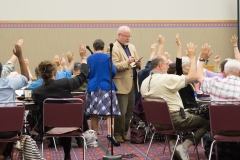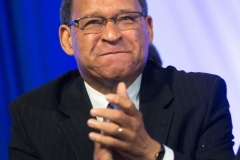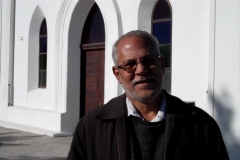Churches aim to build relationships in South Africa
November 1, 2017
Having first visited South Africa in 1984, when the struggle against apartheid was reaching a crescendo, I was overjoyed to be present at the 222nd General Assembly (2016) when, after nearly a decade of study and debate, the Presbyterian Church (U.S.A.) formally embraced the Confession of Belhar and acknowledged its profound capacity to illuminate our calling as followers of Christ.
But the hard part was just beginning. The real challenge has been not simply to clear the constitutional hurdles necessary to add Belhar to our Book of Confessions; it is to live out Belhar’s commitments to unity, reconciliation and justice in our personal and institutional life.
No one appreciates this more than our partners in the Uniting Reformed Church in Southern Africa (URCSA). In 1994, two branches of the Dutch Reformed community — one of them the denomination out of which Belhar originally emerged — merged to form URCSA, overcoming more than a century of segregation.
The process of family reunification remains unfinished, however. The historically white Dutch Reformed Church (DRC) has stopped short of accepting Belhar, while URCSA views such acceptance as essential to a common future.
“So we’ve tried to build relationships at various levels,” said the Rev. Pieter Grove, moderator of URCSA’s Cape Synod. In the Cape, URCSA and the DRC have established joint offices for diaconal ministry and for public witness and mission work. “In very important ministries, we are working together,” Pieter said. “It’s a slow process, but I think people are growing together and getting to know each other’s worlds.”
It is also a difficult and uneven process. “We are constantly challenged, almost defeated, by our social situation, because apartheid segregated us physically and geographically. And, of course, we can’t underestimate the differences of culture,” he added. “In the [Western and Northern] Cape, people of color and white people essentially have one culture. We are Afrikaans-speaking [in URCSA and the DRC]. In the Eastern Cape, our church is mostly Xhosa-speaking.”
However, URCSA’s Cape Synod brings people together across these linguistic and cultural boundaries. Pieter feels that this creates “possibilities to really find substance to our unity. In the other parts of South Africa, it’s much more difficult [to find unity]. The cultures are quite far apart.”
These gaps are even more apparent in the larger society. “Currently in South Africa, there’s great tension between white and black, and racism is still prominent,” Pieter said.
“When you step out of the church into the ‘real’ world, you are confronted by the walls of massive privilege on the white side, and real, deep poverty,” he explained, citing South Africa’s official unemployment rate of 27.7 percent. “The vast majority [of the jobless] are black people. So we have to accept that people will feel frustrated and resentful that some have seemingly everything and others have so little. … We cannot live with this inequality anymore.”
Last year, URCSA’s leadership sent a pastoral letter to all congregations, urging members to consider how racism and prejudice affect the church’s witness and ministry to a wounded society. Moreover, in light of Belhar, it urged Christians to “engage constructively with the issue of racism on different levels.”
It proposed a “Season of Human Dignity” — a dialogue to “discern how we in South Africa are going to be obedient to Jesus.” The conversation is not limited to racism. Church leaders identified other aspects of human dignity that also require attention, including gender, sexuality, poverty, disability, health and education.
Pieter’s own congregation, Sarepta URC, is working to put Belhar into practice through a range of ministries. These include intentional outreach to young people and people who are homeless.
The adoption of Belhar by the PC(USA) and other churches validates Pieter’s hope that this conversation can extend beyond South Africa. “I don’t see Belhar as something that … [is part of] our tradition alone,” he said, “but as something that must transform us. I believe that we can use Belhar to create a very important conversation with the North. We can speak to Europe, to America, to the East, even to the Middle East.”
Dr. Douglas Tilton, Presbyterian World Mission’s Regional Liaison for Southern Africa
Today’s Focus: Belhar
Let us join in prayer for:
PC(USA) Agencies’ Staff
Champaka Srinivasan, PMA
Charles Stanford, PMA
Let us pray:
Loving and merciful God, in Christ you welcome all your children with hope, grace and forgiveness. Lord, let your Spirit move in us. Help us to open our hearts, arms and doors to welcome your children home. Amen.
Daily Readings
Morning Psalms 96; 147:1-11
First Reading Ezra 6:1-22
Or alternate First Reading Lamentations 2:8-15
Second Reading Revelation 5:1-10
Gospel Reading Matthew 13:10-17
Evening Psalms 132; 134


